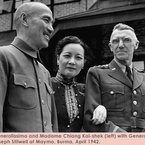
Ramon H. Myers
Ramon Myers passed away in November of 2015.
Ramon H. Myers was a senior fellow at the Hoover Institution.
He received his PhD in economics from the University of Washington. After joining the Hoover Institution, Myers became a member of the US Wheat Studies Delegation to the People's Republic of China in May–June 1976; served as a consultant to the Food Agricultural Organization, Rome, Italy, from November 1979 to January 1980; and taught as a visiting professor of economics at National Taiwan University, Taipei, Taiwan, in 1990–91.
The author of more than one hundred journal articles and book reviews, he was also the associate editor of the Journal of Asian Studies and edited Ch'ing-shih wen-t'i (Studies in Ch'ing History). In 1980, Garland Publishing issued a forty-four volume series that Myers selected and edited entitled The Modern Chinese Economy.
His scholarship and public policy interests have focused on
-
Japanese colonization and imperialism: coedited The Japanese Colonial Empire (Princeton University Press, 1984), The Japanese Informal Empire, 1895–1931 (Princeton University Press, 1989), and The Japanese Wartime Empire, 1931–1945 (Princeton University Press, 1996).
-
Chinese economic history: The Treaty Port Economy in Modern China: Empirical Studies of Institutional Change and Economic Performance (Institute of East Asian Studies, University of California, Berkeley, 2012), coedited with Billy K.L. So; authored The Chinese Peasant Economy (Harvard University Press, 1970), The Chinese Economy, Past and Present (Wadsworth Press, 1978), and two essays in The Cambridge History of China (in vol. 9, part 1, and vol. 13, part 2).
-
Taiwanese history: coauthored A Tragic Beginning: The 1947 Rebellion in Taiwan (Stanford University Press, 1992), The First Chinese Democracy: Political Life in the Republic of China on Taiwan (Johns Hopkins University Press, 1997), coauthored with Tai-Chun Kuo Taiwan’s Economic Transformation: Leadership, Property Rights, and Institutional Change (Routledge Press, 2011).
-
Asian international affairs: Defending an Economic Superpower: Reassessing the US-Japan Security Alliance (Westview Press, 1989), and Greater China and US Foreign Policy (Hoover Press, 1996). Edited Two Chinese States: US Foreign Policy and Interests (Hoover Press, 1978).
-
History of the Republic of China: coedited Storm Clouds over China: The Memoir of Ch'en Li-fu, 1900–1993 (Hoover Press, 1994), Last Chance in Manchuria: The Diary of Chang Kia-ngau (Hoover Press, 1989), and Prescriptions for Saving China: Selected Writings of Sun Yat-Sen (Hoover Press, 1995).
-
China area studies: coedited The New Chinese Leadership: Challenges and Opportunities after the 16th Party Congress (Cambridge University Press, 2004), Making China Policy: Lessons from the Bush and Clinton Administrations (Rowman and Littlefield, 2001) and Understanding Communist China: Communist China Studies in the United States and the Republic of China, 1949–78 (Hoover Press, 1986). Edited The Wealth of Nations in the Twentieth Century (Hoover Press, 1997).
His research papers are available at the Hoover Institution Archives.






